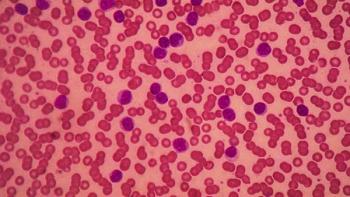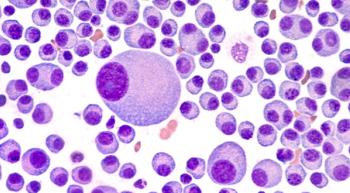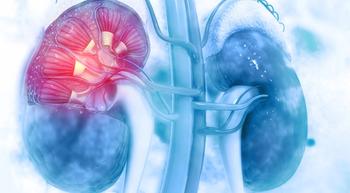
Now in its fifth edition, “The Complete Guide to Breast Reconstruction: Choosing the Best Options After Your Mastectomy” by two-time breast cancer survivor Kathy Steligo offers patients comprehensive, up-to-date information.

Darlene Dobkowski, Managing Editor for CURE® magazine, has been with the team since October 2020 and has covered health care in other specialties before joining MJH Life Sciences. She graduated from Emerson College with a Master’s degree in print and multimedia journalism. In her free time, she enjoys buying stuff she doesn’t need from flea markets, taking her dog everywhere and scoffing at decaf.

Now in its fifth edition, “The Complete Guide to Breast Reconstruction: Choosing the Best Options After Your Mastectomy” by two-time breast cancer survivor Kathy Steligo offers patients comprehensive, up-to-date information.

A woman with stage 4 inflammatory breast cancer details her journey with the disease and why it is important for patients to ask questions about anything going on with their bodies.

Patients with chronic lymphocytic leukemia treated with Imbruvica plus Venclexta demonstrated a healthy immune profile over time in addition to reduction in CLL disease burden.

"I’m on a healthy footing, and that’s pretty miraculous," said singer-songwriter Andrew McMahon, an acute lymphoblastic leukemia survivor and founder of the Dear Jack Foundation.

An expert explained the benefits of proton therapy for the treatment of prostate cancer, which delivers radiation directly to the tumor and spares surrounding areas.

Patients treated with 12 months of Lixiana, an anticoagulant therapy, received a greater benefit than those treated with three months of the therapy.

The recent publication of a guideline recommending mindfulness-based interventions highlight how important it is as a tactic to address symptoms of anxiety and depression in patients with cancer.

With surgical techniques applicable to many stages of kidney cancer, it is important for patients to discuss these options with their cancer team to select the best approach for their disease.

Elrexfio has been shown to provide patients with relapsed/refractory multiple myeloma who previously received four or more lines of therapy with a response that may last at least 15 months, an expert explained.

The recent FDA approval of Talvey for heavily pretreated multiple myeloma results in an improved response to therapy and a manageable side effect profile.

Patients with nonmetastatic node-positive bladder cancer may have similar survival rates whether they underwent treatment with surgery or radical dose radiotherapy.

Reporting MPN side effects to the care team, regardless of how “little” they may seem, can help determine how to adjust treatment to address these symptoms, an expert said.

Cancer teams can decode and analyze DNA from a patient’s tumor to diagnose the disease, determine personalized treatment plans and assess the response to treatment.

Men with prostate cancer who participated in group-based resistance and aerobic exercise regimens had improved sexual function compared with those who underwent usual care.

The Food and Drug Administration granted accelerated approval for Elrexfio for the treatment of patients with relapsed or refractory multiple myeloma who previously received at least four lines of therapy.

Akeega, the first dual action tablet with a PARP inhibitor and abiraterone acetate, was approved for the treatment of patients with suspected or confirmed BRCA-positive metastatic castration-resistant prostate cancer.

Patients with metastatic clear cell renal cell carcinoma who received corticosteroids during Opdivo treatment did not experience a negative impact on survival.

This regular approval provides Gavreto as a treatment option for patients with metastatic RET fusion-positive non-small cell lung cancer.

Patients with head and neck cancer treated with dysphagia-optimized intensity-modulated radiotherapy had improved swallow function compared with those treated with standard intensity-modulated radiotherapy.

In conjunction with Cancer Champions, CURE® recently hosted the “Educated Patient® Webinar: An Overview of Diet and Exercise in Cancer Care."

Researchers conducting this trial will compare zipalertinib plus chemotherapy with chemotherapy alone in patients with previously untreated, locally advanced or metastatic non-small cell lung cancer with the EGFR exon 20 insertion mutation.

High-level results from a phase 3 trial demonstrated that treatment with batiraxcept did not improve progression-free survival in patients with platinum-resistant ovarian cancer.

Patients with advanced Merkel cell carcinoma treated with Opdivo had improved disease-free survival rates compared with those who underwent observation.

Paul Reubens, who played Pee-Wee Herman since the 1980s, has died from cancer — a diagnosis he decided to keep private.

Recent developments in the use of immunotherapy for lung cancer have provided more treatment options for patients while potentially reducing side effect profiles.

Advancements have been made over the last decade in the use of immunotherapy for the treatment of skin cancers including melanoma, squamous cell carcinoma and Merkel cell carcinoma.

This particular designation may expedite the process of approving Xpovio for the treatment of patients with myelofibrosis to address an unmet medical need.

Patients with Medicaid or no insurance may have worse survival outcomes compared with Medicare or private insurance in those with metastatic renal cell carcinoma.

Palliative care can benefit patients with advanced cancer by integrating advanced care planning, pain and symptom management and counseling, among other aspects.

Adolescents and young adults undergoing VEGF treatment for nonmetastatic, high-risk renal cell carcinoma may still experience heart-related conditions like left ventricular systolic dysfunction and high blood pressure.